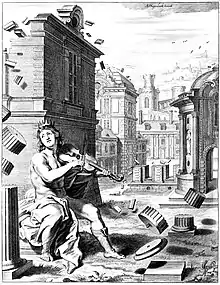Amphion
There are several characters named Amphion[1] in Greek mythology:

Amphion building Thebes with the power of music, from a 1655 engraving
- Amphion, son of Zeus and Antiope, and twin brother of Zethus (see Amphion and Zethus).[2] Together, they are famous for building Thebes. Pausanias recounts an Egyptian legend according to which Amphion employed magic to build the walls of the city.[3] Amphion married Niobe, and killed himself after the loss of his wife and children (the Niobids) at the hands of Apollo and Artemis. Diodorus Siculus calls Chloris his daughter,[4] but the other accounts of her parentage identify her father as another Amphion, the ruler of Minyan Orchomenus (see below).
- Amphion, son of King Iasus of Orchomenus, son of Persephone, daughter of Minyas. He became the father of Chloris, wife of Neleus[5] and Phylomache, wife of Pelias;[6] these husbands are sons of Tyro and Poseidon. This Amphion is an obscure character, said to be a king of the Minyans of Orchomenus, in Boeotia.
- Amphion, son of Hyperasius, son of Pelles, son of Phorbas.[7] From Achaean Pellene, he and his brother Asterius were counted among the Argonauts that sailed to Colchis.[8] In two separate accounts, Hypso was called their mother[9] while Hippasus was said to be their father.[10]
- Amphion of Elis, an Achaean warrior who took part in the Trojan War on the side of the Greeks. He was a commander of the Epeans, together with Meges and Dracius.[11]
- Amphion, friend of the celebrated architect Epeius. He was killed by Aeneas.[12]
- Amphion, centaur who attended Pirithous' wedding, fought against the Lapiths, tried to plunder Pholus of his wine and was killed by Heracles.[13]
Notes
- /æmˈfaɪ.ɒn/ (Ancient Greek: Ἀμφίων, romanized: Amphīōn "native of two lands",(Graves, p. 669) derived from ἀμφί amphi "on both sides, in all directions, surrounding" as well as "around, about, near", Latin Amphīon, adjective Amphionian)
- Homer, Odyssey 11.260–3; Brill's New Pauly s.v. Amphion; Grimal, s.v. Amphion, p. 38.
- Pausanias, 6.20.18
- Diodorus Siculus, 4.68.6
- Apollodorus, 1.9.9; Scholia on Homer, Odyssey 11.281 citing Pherecydes
- Apollodorus, 1.9.10
- Pausanias, 7.26.12
- Apollonius Rhodius, Argonautica 1.176
- Valerius Flaccus, 1.367
- Hyginus, Fabulae 14
- Homer, Iliad 13.685–93
- Quintus Smyrnaeus, 10.111
- Diodorus Siculus, 4.12.7
References
- Apollodorus, The Library with an English Translation by Sir James George Frazer, F.B.A., F.R.S. in 2 Volumes, Cambridge, MA, Harvard University Press; London, William Heinemann Ltd. 1921. ISBN 0-674-99135-4. Online version at the Perseus Digital Library. Greek text available from the same website.
- Apollonius Rhodius, Argonautica. George W. Mooney. London. Longmans, Green. 1912. Greek text available at the Perseus Digital Library.
- Brill’s New Pauly: Encyclopaedia of the Ancient World. Antiquity, Volume 1, A-Ari, editors: Hubert Cancik, Helmuth Schneider, Brill, 2002. ISBN 978-90-04-12258-1. Online version at Brill.
- Diodorus Siculus, The Library of History translated by Charles Henry Oldfather. Twelve volumes. Loeb Classical Library. Cambridge, Massachusetts: Harvard University Press; London: William Heinemann, Ltd. 1989. Vol. 3. Books 4.59–8. Online version at Bill Thayer's Web Site
- Diodorus Siculus, Bibliotheca Historica. Vol 1-2. Immanel Bekker. Ludwig Dindorf. Friedrich Vogel. in aedibus B. G. Teubneri. Leipzig. 1888–1890. Greek text available at the Perseus Digital Library.
- Gaius Valerius Flaccus, Argonautica translated by Mozley, J H. Loeb Classical Library Volume 286. Cambridge, MA, Harvard University Press; London, William Heinemann Ltd. 1928. Online version at theio.com.
- Graves, Robert, The Greek Myths, Harmondsworth, London, England, Penguin Books, 1960. ISBN 978-0143106715
- Grimal, Pierre, The Dictionary of Classical Mythology, Wiley-Blackwell, 1996. ISBN 978-0-631-20102-1.
- Homer, The Iliad with an English Translation by A.T. Murray, Ph.D. in two volumes. Cambridge, MA., Harvard University Press; London, William Heinemann, Ltd. 1924. Online version at the Perseus Digital Library.
- Pausanias, Description of Greece with an English Translation by W.H.S. Jones, Litt.D., and H.A. Ormerod, M.A., in 4 Volumes. Cambridge, MA, Harvard University Press; London, William Heinemann Ltd. 1918. Online version at the Perseus Digital Library
- Quintus Smyrnaeus, The Fall of Troy translated by Way. A. S. Loeb Classical Library Volume 19. London: William Heinemann, 1913. Online version at theio.com
This article is issued from Wikipedia. The text is licensed under Creative Commons - Attribution - Sharealike. Additional terms may apply for the media files.